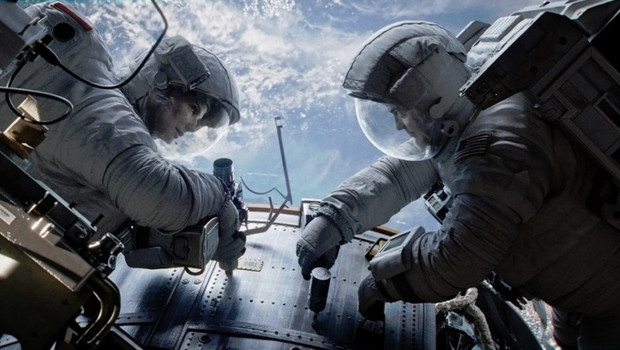Gravity
Alfonso Cuaron’s space station disaster saga “Gravity” is an intellectually-soft video game, a SuperMario of space debris and a disappointment as a space-survival story.
A great deal of praise is being heaped on the 3-D outer space experience, labeled as immersive and hypnotic. Comparisons are being drawn to the upside-down, gravity-free experience of “2001: A Space Odyssey.” I don’t buy it. I don’t know a film-critic-y way to say that outer space looks fake, but outer space looks fake: over-colored and peppery, like Middle Earth with the lights out. Space might be the final frontier but it’s made in a Hollywood basement, sing the Red Hot Chili Peppers. I felt entirely aware of being in the basement.
Andrei Tarkovsky’s “Solaris,”a great and moving space station film, posits man’s foolish desire to treat space as an extension of earth, of what is known to him. “2001” and “Solaris” use the foreign nature of space as a liberating force, telling stories of unthinkable possibilities and reaching a wider perspective. By contrast, Cuaron’s picture reduces space to an outgrowth of human sensibility. A story embedded in survival instincts, it is human experience not at its most expansive but at its most confined and primitive.
Sandra Bullock and George Clooney are astronauts on a shuttle mission to repair a satellite. An explosion ruins a lovely spacewalk. A shower of space junk scatters them in the looming darkness, desperately floating from space station to space station to survive. Never mind that real space stations take days to reach for rocket-powered spacecraft. In “Gravity,” they are a short day trip for a jet pack.
Perhaps the fritzing satellite worked as a thematic generator. Intellectually, “Gravity” feels interrupted and shattered by a surprise storm of space debris, a random jumble of floating mother and birth imagery that never connects the cord. The would-be feminist storyline also fails. Good feminist icons do not spend this much of a movie whimpering, waiting to be told what to do by men. Sometimes the men are dead (in probably the worst scene in a serious movie this year).
What should we think about Sandra Bullock as an introverted scientist and astronaut? Her performance is strong in big, immediate senses (fear, bravery, relief) but doesn’t leave much to the subtle or inscrutable. Her character, Ryan Stone, claims to have a daughter on earth who died young. Ask yourself, are you ever convinced that this daughter exists? Or does it feel like a transparently-B.S. plot point? It’s never sold, and it’s probably unsellable.
Seven years is a long time in the film game. It has been that long since Cuaron made “Children of Men.” That film’s weakness in story was made up by the social commentary and fantastic trailing shots by Emmannuel Luzbeski (who again helms “Gravity”). In “Gravity,” the eye and the mind capture far less, dragging Gravity to the ground.







